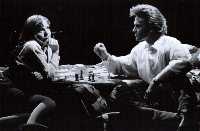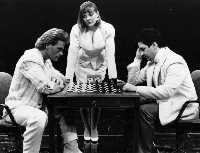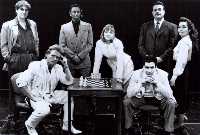It would seem that after a show fails on Broadway and loses its entire capitalization, people would not be clamoring for the rights to mount it again anywhere else. Particularly since Trevor Nunn's contract stipulated that he must be offered the job of director in any production staged in North Amerca and Richard Nelson's contract mandated that his book MUST be used. No one could do the London version in the U.S. or Canada.
But many producers and directors had loved the show in London and even those who had just seen the Broadway version thought it could be fixed.
Though it opened shortly after the premiere of the U.S. Tour, the highly respected Marriott Lincolnshire Theatre's Chess really came first. It was originally conceived as the first stop on the American Tour. But the Marriott has arena staging, and the tour producer wanted a proscenium version. Kary Walker, Dyanne Earley and Peter Grigsby, with director David H. Bell and their design team, had produced dozens of successful and critically-acclaimed shows in the prior ten years. They knew they wanted to do Chess as soon as they saw it in London.

But, according to Grigsby, "Everyone has very violent opinions about this show." They were also saddled with the Nelson book which they first believed was sacrosanct. They knew they had to re-think the entire piece while making as few changes as possible. They felt that making the characters more sympathetic was the key. This was accomplished by a combination of direction, casting and subtle rewriting.
Kim Strauss, cast as Freddie, had the toughest challenge. But he's a handsome, engaging actor and by softening his scenes with Florence, making "Pity the Child" a solitary cry for help (instead of placing it in the context of an interview as had been done in New York), Strauss and director David H. Bell made the character work.
Susie McMonagle's Florence was played less as an angry, confused woman and more as a contemporary, intelligent woman with a streak of sensuality very close to the surface. Bell dropped many hints of her eventual attraction to Anatoly, which helped the romance's credibility.

Arena staging--with the playing area in the center and the audience on all four sides--can be challenging. It allows scenes to be staged more naturalistically and intimately, but it limits the playing area and sets. But this team was experienced working with their stage and knew its limitations as well as its possibilities.
In lieu of elaborate sets, the Marriott team created some extra "characters" in the form of American and Russian chess pieces--kings, queens and knights--dressed in stylized Camelot-style finery. With their elegant black, gold and silver costumes and wire sculpted chess piece scepters, they became sets themselves as well as metaphors. Bell used them to propel, comment on, and define the action.
The illusion of rooms and settings was done with overhead light-grid ceiling fixtures and sections of the set floor which rose to simulate beds and tables. The most ingenious use of these platforms was using a single double bed as half of one room and half of another, the bed virtually (but not literally) split down the middle. But the single thing that--more than any other--made Chicago's Chess work was that they gave Florence back her father.

The final reunion of Florence and her father may be schmaltz, but it had an honest and contemporary feel. All the jokes about glasnost and perestroika don't do as much as this one change: in a warmer climate of East/West relations, she probably would have her father returned to her. All the characters here are made of sterner, stronger stuff than in previous versions, and helping bring about the Vassy family reunion is a final act of love on Anatoly's part and thus he returns home a victor, not the vanquished.
Clearly, the Marriott Chess benefited from the collaborative approach. The producers, director and design team all helped rewrite and rethink the piece, and it showed. There was no aspect of the performance which was out of place or in contradiction of mood or style with any other aspect. And they made it appeal to a wide range of people. Walker said, "We were worried about our weekday matinee audiences who dislike loud, rock scores. But by giving Florence back her father, they forgave us everything."
The word went out that the Lincolnshire Chess was a hit. A State Department-sponsored tour of theatre producers from all over the world visited this Chess in its Chicago suburb; many regional theatre producers flew in to see it and planned productions in their own houses in 1991. Tim Rice was extremely impressed with their work and said he was encouraged that they'd made it work so well. He particularly liked the way the dual bedroom scenes connected all the characters. It closed after a $1-million-plus sold-out limited engagement.

